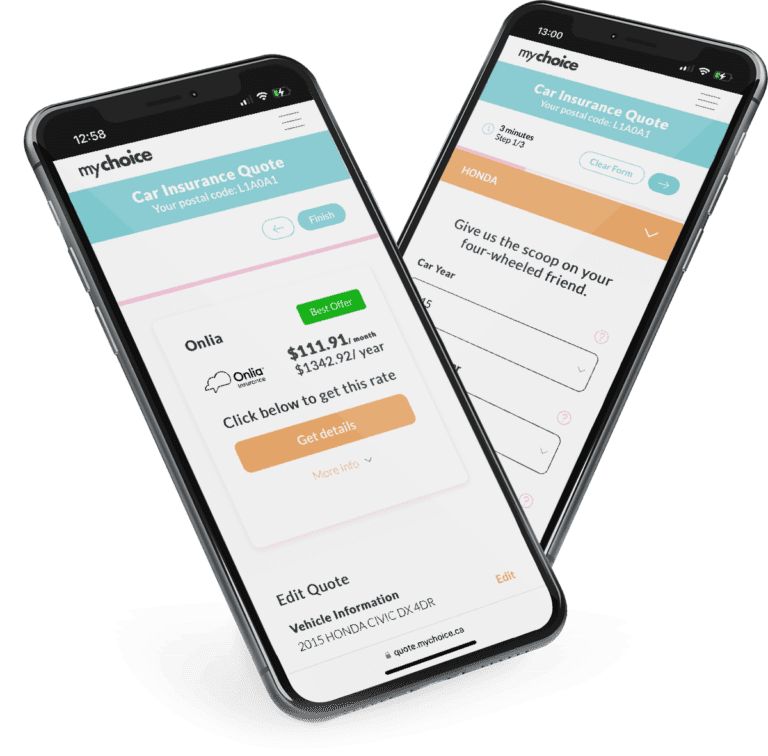Quick Facts About Auto Insurance in Nova Scotia
- Nova Scotia is the fourth-cheapest province for car insurance, with an annual average of $820.
- Halifax has been named the Canadian collision capital, with an accident frequency of 7.9 per 100 cars.
- Nova Scotians aged 15 to 24 are the most likely to get injured or killed in vehicle collisions.
- Driving under the influence contributed to nearly 25% of Nova Scotia’s car accidents.
- You can save up to $582 annually by comparing quotes through MyChoice.
How Can You Get Cheap Car Insurance in Nova Scotia?
The best way to get cheap car insurance in Nova Scotia is to find the lowest-priced policies and reduce your risk profile, landing you more affordable premiums. Here’s how you can find the best insurance policy deals:
Purchase Safe and Reliable Cars
Most Canadian insurance companies use CLEAR (Canadian Loss Experience Automobile Rating) to determine a car’s safety and reliability. A high CLEAR score means the car is safer, leading to lower insurance premiums.
Fortunately, the CLEAR database is open to the public, so you can check the score of any car model you have eyes on. If you buy a car with low CLEAR scores, prepare to pay higher Nova Scotia car insurance premiums.
Consider Taking Usage-Based Insurance
Usage-based insurance (UBI) or pay-as-you-go insurance is great if you drive safely and don’t travel much. This insurance calculates your rates by analyzing your driving habits and car mileage. If you’re a proven safe driver, you can save up to 30% on premiums with UBI.
Pay Annual Premiums
Insurers give discounts if you pay premiums annually because you’ll be committed to them for the long haul. The initial expense is higher but, as the per-month cost is cheaper, so are the long-term savings.
If you can’t afford to pay a full year in advance, ask your insurance company about half-year premiums.
Practise Safe Driving
Accidents and traffic violations stay on your insurance record for a long time and can raise your rates. Keep your driving record clean to ensure you get the lowest Nova Scotia auto insurance premiums. You can also take accredited driving lessons to show insurers you’re committed to driving safely and lower your rates further.
Remove Unnecessary Optional Coverage
Taking extra coverage options beyond the minimum requirement protects you from more hazards but raises your premiums. Consider skipping unnecessary optional coverage if you want to save money on car insurance.
Compare Policy Deals
Comparing deals between multiple insurance providers helps you identify which one offers the most value. To find the best deals, use MyChoice to compare Nova Scotia car insurance quotes.
Take Home and Auto Bundles
Insurance companies give discounts for home and auto bundles because you’re giving them more business. In most cases, policy bundles are cheaper than individual home and auto policies from two different companies.
Ask For a Higher Deductible
You must pay deductibles on insurance claims before the financial benefits kick in. Higher deductibles mean paying more out of pocket in case of an accident, but the trade-off is lower insurance premiums. Conversely, lower deductibles reduce your out-of-pocket expenses but raise your insurance premiums.
How Does Car Insurance Work in Nova Scotia?
Car insurance in Nova Scotia works like most other provinces, where the insurer will provide a certain amount of money in case of an auto accident. Auto insurance is mandatory for all drivers in Nova Scotia, so you must have an insurance policy to drive legally.
Getting caught driving without insurance means the Registry of Motor Vehicles will suspend your driving privileges. To drive again, you need to get insured and pay all fines. The first offence fine is $1,250, but repeat offenders can be charged up to $5,850.
By Nova Scotian law, you’re required to have the following auto insurance coverage:
- $500,000 in third-party liability coverage
- $50,000 in medical payments coverage
- $2,500 in funeral expense coverage
- Accident benefits coverage
- Uninsured and unidentified driver coverage
- Direct compensation for property damage (DCPD) coverage
Here’s an overview of the three major insurance coverage options:
Third-Party Liability (TPL)
TPL insurance pays out if you’re at fault for an accident that damages someone’s vehicle or gets somebody hurt or killed.
Direct Compensation for Property Damage (DCPD)
DCPD pays for your vehicle repairs if another insured driver causes an accident.
Accident Benefits
Accident benefits pay for medical bills, income replacement, and possibly funeral expenses for you, your passenger, or a pedestrian if they’re hurt or killed in a car accident.
You need all the previously-mentioned insurance coverage to drive legally in Nova Scotia, but they don’t protect you from all the dangers. Here are some popular auto insurance coverage options you can consider adding to your plan:
Additional TPL Coverage
While the $500,000 TPL coverage minimum is higher than in other places like Ontario and Alberta, it’s still not a big number if you factor all potential expenses in. Some drivers take extra TPL coverage worth up to $2 million just in case.
Extra Accident Benefits
Accident benefits coverage is limited to $50,000 for four years after an accident. If you want to protect yourself from longer-term injuries or disabilities, you may need additional coverage.
Limited Depreciation Waiver
Having your car stolen or totalled in an accident means there’s almost no way to get it back. Fortunately, a limited depreciation waiver can refund your car’s purchase price in the case of a total vehicle loss.
Ridesharing Coverage
Rideshare drivers need extra insurance because they often drive longer and further than others, increasing their accident risk. To mitigate this risk, insurers offer special ridesharing coverage that protects drivers from accidents during their trips.
Collision Insurance
If you’re at fault, your mandatory insurance coverage doesn’t cover car repair costs. Collision insurance lightens the financial load of car repair costs if you’re ever at fault for an accident.
Comprehensive Insurance
External factors like weather, criminals, fire, and sometimes animal collisions can harm your car. Comprehensive insurance protection keeps your vehicle safe from these often unpredictable dangers, which makes it one of the most important options for additional coverage.
How Your Car Insurance Quotes Are Calculated in Nova Scotia
Nova Scotian insurers use several factors to calculate your car insurance rates. Here’s a look at what factors influence your Nova Scotia auto insurance rates:
Personal Demographics
Personal demographics like age, gender, and marital status influence Nova Scotia car insurance rates because they represent your driving risk.
Drivers under 25 often pay higher insurance premiums because they tend to be accident-prone, high-risk drivers. Once you hit 25, your insurance rates will start declining because you have more driving experience. However, your rates will rise again after age 65 because senior citizens are more likely to get hurt or die in car accidents.
Insurers give lower rates to women because they’re seen as more careful drivers. A similar logic applies to married people, who insurance companies think will take fewer risks because they have family waiting at home. Moreover, married people frequently bundle home and auto insurance, giving them better deals.
Residence
Residents of major cities like Halifax will likely get higher insurance rates because more cars lead to a larger accident risk. Major cities also see more crime, which increases the risk of theft and vandalism.
Driving History and Frequency
Accident-free drivers usually get lower auto insurance premiums in Nova Scotia because insurers consider them lower-risk policyholders. Conversely, people with a long record of car accidents get higher auto insurance rates because insurers believe they’ll get into more accidents in the future.
Driving frequency is also related to accident risk because the more you drive, the more likely you’ll be involved in an accident. Someone who only drives on the weekend will get lower rates than someone who drives to work daily.
Vehicle Type
Not all cars are created equal – some are safer than others. Insurers use CLEAR (Canadian Loss Experience Automobile Rating) to measure a car model’s accident risk. Models that see lots of theft and accidents generally have a low CLEAR score, which means insuring them is more expensive.
Coverage Options
Extra insurance coverage protects your car from more hazards but increases your insurance premiums. Consider skipping unnecessary coverage options to save money on auto insurance.
Most Expensive Cities to Insure a Car in Nova Scotia
The average annual car insurance rate in Nova Scotia is $820, making it the fourth-cheapest province in the nation. However, some areas of the province can be more expensive than others. The two most expensive cities for car insurance in Nova Scotia are Cape Breton at $1,197/year and Halifax at $1,100/year.
Here’s a detailed look at the most expensive cities for car insurance in Nova Scotia:
| City | Average car insurance rate |
|---|---|
| Cape Breton | $1,197 |
| Halifax | $1,100 |
| Truro, Amherst | $1,042 |
Least Expensive Cities to Insure a Car in Nova Scotia
Fortunately, Nova Scotia also has several cheap cities for car insurance. Here’s a look at the most affordable cities for car insurance in Nova Scotia:
| City | Average car insurance rate |
|---|---|
| Mahone Bay | $613 |
| Lunenburg | $619 |
| Liverpool | $629 |
Car Insurance Cost in Nova Scotia by Age
Nova Scotia auto insurance premiums fluctuate depending on your age. People under 25 usually pay more for insurance due to their inexperience. Similarly, people over 65 also pay more premiums because their accident risk increases.
Here’s a look at car insurance premiums in Nova Scotia by age:
| Age group | Average cost | Annual savings with MyChoice |
|---|---|---|
| 18-20 | $2,927 | $582 |
| 21-24 | $1,672 | $332 |
| 25-34 | $1,115 | $221 |
| 35-44 | $820 | $163 |
| 45-54 | $672 | $133 |
| 55-64 | $571 | $113 |
| 65+ | $651 | $129 |
Car Insurance for Specific Demographics in Nova Scotia
All drivers in the province must have auto insurance to drive legally, with no exceptions. However, you may be wondering whether certain demographics get discounts or special treatment.
Here are some tips to get the best car insurance deals as members of certain demographics:
Car Insurance for High-Risk Drivers
Even if you have a lengthy accident record, you still need car insurance to drive legally. Unfortunately, many insurers might think twice about issuing your policy or give you extremely high rates if you have a bad driving history.
You can look into high-risk driver insurance companies if you can’t get affordable insurance due to your accident record. You can also get insurance through the Facility Association, which writes insurance policies for everyone regardless of track record.
Car Insurance for New Immigrants
New immigrants aren’t exempt from auto insurance requirements. There aren’t any special policies for new immigrants, but you can still qualify for a regular auto insurance policy. Some insurers accept your country of origin’s licence or an International Driving Permit, but you’ll need to get a Nova Scotia driver’s licence soon after arrival.
Car Insurance for Students
Insurance for students below 25 is more expensive because younger drivers are often inexperienced. While there aren’t any special insurance products for students, you can still lower your rates by paying annual premiums, skipping extra coverage, and picking reliable cars.
Car Insurance for Seniors
Car insurance for senior citizens is expensive because elders are more likely to die or get hurt in accidents. Fortunately, you can still lower your rates like other drivers by driving safely, bundling policies, and taking accredited driving courses.
Car Insurance Cost in Nova Scotia by Driving History
Insurers check your driving history to determine auto insurance rates to predict future driving behaviour. Having traffic violations on your record may make them think you’re a high-risk driver and charge you accordingly.
Depending on the severity and frequency of your traffic violations, you can pay many times over the average Nova Scotia auto insurance rate as a bad driver. Here’s a quick look at how a bad driving record influences your auto insurance premiums:
| Driving violation | Average annual car insurance rate |
|---|---|
| Clean driving record | $820 |
| Insurance cancellation due to non-payment | $1,344 |
| Licence suspension for alcohol-related offences | $984 |
| One accident | $1,804 |
| Speeding ticket | $1,066 |
Other Factors That Affect Car Insurance Prices in Nova Scotia
Insurers calculate your auto insurance rates based on many factors. Here are some additional things that could influence your Nova Scotia car insurance rates:
Vehicle Model Age
Older car models usually get higher insurance rates because they have fewer safety measures than newer models and spare parts may be rarer. Ensure you can afford the insurance before buying a vintage car.
Local Crime Rates
High crime rates mean that vandalism and theft are more common. Insurers often assign higher rates to residents of high-crime areas to offset the higher risk of theft and vandalism.
Loyalty Bonuses
Insurance companies often reward long-time customers with discounts and other benefits. Consider asking your insurer about rate reductions or special discounts if you’ve been a policyholder for several years.
Main Mode of Commuting in Nova Scotia
Similar to most provinces, personal vehicles are the most popular mode of commuting in Nova Scotia. However, public transit isn’t as popular in Nova Scotia since its users only represent 4.1% of the province’s total commuters. The second-most popular mode of commuting in Nova Scotia is instead walking, which stands at 5.6%. Here’s a detailed look at how people commute in Nova Scotia:
| Main mode of commuting | Counts | Rates |
|---|---|---|
| Total – 25% Sample Size | 336,015 | 100.0 |
| Car, truck or van | 293,665 | 87.4% |
| Car, truck or van – as a driver | 267,755 | 79.7% |
| Car, truck or van – as a passenger | 25,910 | 7.7% |
| Public transit | 13,895 | 4.1% |
| Walked | 18,975 | 5.6% |
| Bicycle | 1,605 | 0.5% |
| Other method | 7,810 | 2.3% |
Commuting Duration in Nova Scotia
Commuting times in Nova Scotia are usually short, with around three-quarters of the province’s commuters spending under half an hour getting to work. Commutes of over 45 are rare, representing about 9% of the province’s commuters. Here’s a detailed look at the commuting duration in Nova Scotia:
| Commuting duration | Counts | Rates |
|---|---|---|
| Total – 25% Sample Size | 336,015 | 100.0 |
| Less than 15 minutes | 128,938 | 38.4% |
| 15 to 29 minutes | 123,315 | 36.7% |
| 30 to 44 minutes | 51,690 | 15.4% |
| 45 to 59 minutes | 15,840 | 4.7% |
| 60 minutes and over | 16,230 | 4.8% |
Who Provides Car Insurance Quotes in Nova Scotia?
Insurance brokers, agents, aggregators, and direct writers provide car insurance quotes in Nova Scotia. While they all offer auto insurance, they specialize in different things. Here’s a quick look at each insurance provider type:
Insurance Brokers
Insurance brokers don’t work for a specific company, so they can freely search the market and compare insurers to give you the best deals. Brokers understand the ins and outs of Nova Scotia’s insurance market, so you can ask them questions about auto insurance policies.
Direct Writers
Direct writers only sell policies from one insurer, like agents. However, they’re usually cheaper than insurance agents because they don’t have physical offices. Direct writers are great if you want to save money, but you can’t book face-to-face meetings with them.
Insurance Agents
Insurance agents work for one insurer, so they may offer fewer choices than insurance brokers. However, they know every minute detail of the products they’re selling and can even apply discounts that are unavailable to brokers. Agents can also close sales independently, meaning you’ll finish your policy sale quicker.
Insurance Aggregators
Insurance aggregator websites like MyChoice compile policy deals from numerous insurers to help you find the best-valued offers. Aggregators are usually free for customers, meaning you can find affordable auto insurance in Nova Scotia without spending a penny.
The Most Common Questions About Car Insurance in Nova Scotia
Are Nova Scotia-filed auto insurance policies in the public record?
Nova Scotia-filed auto insurance policies aren’t in the public record. However, certain authorities like insurers and the police can check your auto insurance policy on their database.
Are police vehicles exempt from insurance laws in Nova Scotia?
We can assume police vehicles are exempt from insurance laws in Nova Scotia because the Motor Vehicles Act doesn’t require them to have insurance.
Are winter tires mandatory in Nova Scotia?
Using winter tires in Nova Scotia is recommended by government officials but not required by law.
Can I register a vehicle in Nova Scotia without insurance?
No, you can’t register a vehicle in Nova Scotia without insurance because you need a policy to legally register a vehicle.
Can parking tickets affect your insurance in Nova Scotia?
Parking tickets don’t affect your insurance in Nova Scotia, but traffic tickets do. Insurers generally search for proof of moving traffic violations as part of their premium calculation process.
Can you get temporary car insurance in Nova Scotia?
You can’t get temporary car insurance in Nova Scotia – the shortest policy you’ll find is a six-month policy.
Do you need insurance before registering a car in Nova Scotia?
You need insurance before registering a car in Nova Scotia because it’s one of the required documents.
Does age affect your car insurance in Nova Scotia, Canada?
Age does affect your car insurance in Nova Scotia, Canada. Generally, you’ll receive high rates as a teen until you hit 25. Then, your rates will decline every year until you reach 65 years of age, when premiums will rise again.
Does Nova Scotia accept electronic car insurance proof?
Nova Scotia accepts electronic car insurance cards as proof in addition to the traditional pink cards.
How do I file a claim in Nova Scotia?
You can file a car insurance claim in Nova Scotia by contacting your insurer as soon as possible. From there, you need to follow their instructions to ensure your claims process is completed successfully.
How long do driving offences or accidents last on my driving record in Nova Scotia?
In Nova Scotia, driving offences or accidents last about two years on your driving record.
Is driving without car insurance a criminal offence in Nova Scotia?
Driving without car insurance isn’t a criminal offence in Nova Scotia. However, getting caught driving without car insurance will result in penalties and fines.
Is Nova Scotia car insurance no-fault?
Nova Scotia car insurance runs on a no-fault system, meaning your insurer is responsible for covering your vehicle damage regardless of who’s at fault.
Is there a tax on car insurance in Nova Scotia?
Per the Insurance Act of Nova Scotia, there is a tax on car insurance in the province.
How do I get a car insurance pink slip in Nova Scotia?
You can get a copy of your car insurance pink slip in Nova Scotia by requesting one from your insurance provider.
Who regulates Nova Scotia auto insurance?
Auto insurance in Nova Scotia is regulated by the Nova Scotia Insurance Review Board (NSIRB), which monitors insurers, ensuring their compliance with the Insurance Act.
Who will insure a modified car in Nova Scotia?
Almost all insurers can insure a modified car in Nova Scotia. However, your modifications must be legal, and you must inform the insurer beforehand.
Why is car insurance so cheap in Nova Scotia?
Nova Scotia car insurance is cheap because of government reforms in 2003 that reduced insurance rates by 27% in the entire province.



















